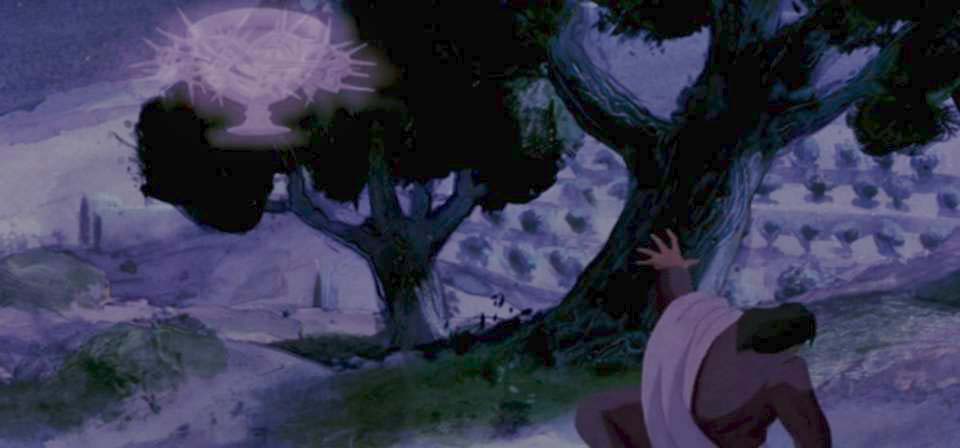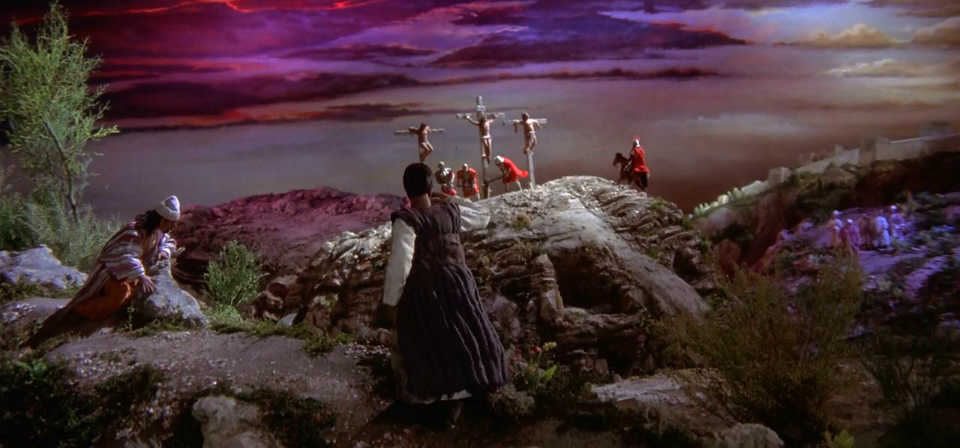The Miracle Maker (2000)
In The Miracle Maker, the film’s makers have a small miracle of their own: a simple, modest retelling of the gospel story of the ministry and passion of Christ that does little more than present the bare events of the gospel narratives, without adornment or invention, without idiosyncratic "explanations" or editorial spin, without elaborations for the sake of amusement or excitement.
Caveat Spectator
Restrained passion-narrative dramatization; some intense scenes depicting evil spirits and demonic possession that could be frightening to young children.It’s so straightforward, it’s practically revolutionary. Adapting a story for the screen substantially as it was written is a lost art nowadays. It’s easy to see why, in a way; storytellers are just naturally attracted to projects to which they feel they have some creative contribution to make; some special angle or insight to offer.
Well, these filmmakers made a creative contribution, all right — but it wasn’t the message, it was the medium. The Miracle Maker is a groundbreaking work of astoundingly lifelike stop-motion animation, supplemented with traditional hand-drawn animation for flashbacks and other special sequences, and digital effects here and there (water, fire).
If the term "stop-motion animation" makes you think of the droll characters from Chicken Run or The Nightmare Before Christmas, think again. These realistic figures — and their authentic-looking middle-Eastern miniature sets — were created by a team of meticulous Russian puppeteers working with Welsh filmmakers with an eye to naturalism. The result, while not as smooth or polished as the high-tech effects of the Toy Story films, is a world of breathtaking authenticity; at times, especially in midrange shots, it’s so real you can almost forget you aren’t watching live action.
Aiding the effect are the considerable vocal talents of a stellar cast including Ralph Fiennes (Jesus), Miranda Richardson (Mary Magdalene), Richard E. Grant (John the Baptist), and William Hurt (Jairus). Following the convention of Dorothy Sayer’s The Man Born to Be King, the cast employ upper-class British accents for the educated Jewish and Roman leaders, but broad Scottish or related accents for the fishermen and other common folk.
A performance highlight is Jesus’ preaching: Fiennes sounds like a man improvising a public speech as he delivers long-familiar words about the house on the rock or the parable of the mustard seed. His Jesus is attractive, composed, commanding, and compassionate; he can rise to righteous anger (as at the cleansing of the temple), but has an acute sense of humor (seen particularly in satirical parables such as the log in the eye).
The most noteworthy thing about this production, though, is not the performances or even the animation, but the reverent, mature approach to the story. In using their remarkable technique to bring the gospel story to life, the filmmakers have succeeded admirably in fulfilling the ideal of St. John Chrysostom: "Not to say anything new, but to say it in a new way."
That’s not to say the screenplay by Murray Watts (who also wrote a 1998 animated TV version of Beowulf) takes no license at all. Events have been rearranged, conversations invented or expanded. Much of the story is seen from the point of view of the daughter of Jairus the synagogue leader, the girl whom Jesus raised from the dead (here named "Tamar"), as well as that of Jairus himself and his wife. Tamar, along with one or both of her parents, shows up at various points in the story: at the beginning of Jesus’ ministry, as he leaves his carpentry work; at the Sermon on the Mount; at the healing of the paralyzed man; and (after Tamar has been raised) on Good Friday, as Jesus carries his cross down the Via Dolorosa.
But all this is pretty modest stuff. Even good adaptations, like The Prince of Egypt, usually take generous dramatic license with their source material, reworking to make their stories more interesting, accessible, or exciting, to fill in narrative gaps, or to help audience members draw whatever the filmmakers happen to feel is the proper conclusion. That’s not necessarily a bad thing; depending on the filmmakers, the result is sometimes very good (The Prince of Egypt) and sometimes very bad (last year’s Noah’s Ark miniseries). But always it’s as much about the filmmakers and their vision, as about the original text or the author’s vision. The story of The Miracle Maker, to a great degree, isn’t about the filmmakers. For the most part they’ve simply tried to get out of the way and let the evangelists speak.
Given a running time of 90 minutes, the evangelists couldn’t be allowed to say everything. Thus, screenwriter Watts’ most important contribution was choosing what to keep and what to leave out; and in general he’s made pretty good decisions. The nativity of Christ is here, in flashback, along with the shepherds and the gifts of the Magi; but not the annunciation to Mary, the visitation to Elizabeth, or the flight into Egypt. There’s the divine acclamation from heaven following Jesus’ baptism by John (though John doesn’t actually touch Jesus, who simply plunges himself beneath the surface), and the temptation in the wilderness; but the Transfiguration has been omitted. There’s the miraculous catch of fish, but not the feeding of the 5000; the promise to build on Peter the rock is here, though not Peter’s confession of faith or the keys of the kingdom.
A few unfortunate calls were made in editing the passion narratives. I can understand leaving out the scourging at the pillar (which might have been too intense for many children anyway), but I would have liked to see Simon of Cyrene helping Christ with his cross. Of the seven words of Christ from the cross, the story retains only "Into thy hands I commend my spirit" and "It is finished"; gone are "Father, forgive them"; "My God, my God, why have you forsaken me?"; "Woman, behold your son; son, behold your mother." (Mary the mother of Jesus doesn’t seem to be present at the cross here, and is sadly deprived of the Cana story also.) And, while leaving out the soldiers casting lots for Christ’s clothes is defensible, omitting the guards at the tomb is really not. On the other hand, the death of Christ is accompanied by a dramatic rending of the temple veil, a significant detail that could easily have been left out.
While it’s possible to quarrel with what the film doesn’t do, what it does do is virtually beyond reproach. Notwithstanding its simplicity — or because of it, rather — The Miracle Maker is quite simply one of the most genuinely profound and noteworthy depictions of the gospel story of all time, in any medium. It’s appropriate for most children, yet mature and not in the least juvenile or condescending — truly family fare. An instant classic, bound to become an enduring Easter favorite, The Miracle Maker is easily this year’s most religiously significant film.
Related

A Triduum ritual: The Miracle Maker
Our seasonal movie-watching during Advent, Lent, and the Christmas and Easter seasons varies from year to year, but Triduum is always the same.

Must-see Easter season viewing: The Jesus movie for absolutely everyone
The Miracle Maker is a singular achievement: a Jesus movie that is simple enough for children, sophisticated enough for scripture scholars and theologians, and artful enough for discerning cinephiles.
RE: Jesus movies
Link to this itemRecently I heard Steven on the Son Rise Morning Show talking about a DVD that was I believe Passion-based and good for the family. Might you know which film he was speaking of?
Recent
- Benoit Blanc goes to church: Mysteries and faith in Wake Up Dead Man
- Are there too many Jesus movies?
- Antidote to the digital revolution: Carlo Acutis: Roadmap to Reality
- “Not I, But God”: Interview with Carlo Acutis: Roadmap to Reality director Tim Moriarty
- Gunn’s Superman is silly and sincere, and that’s good. It could be smarter.
Home Video
Copyright © 2000– Steven D. Greydanus. All rights reserved.